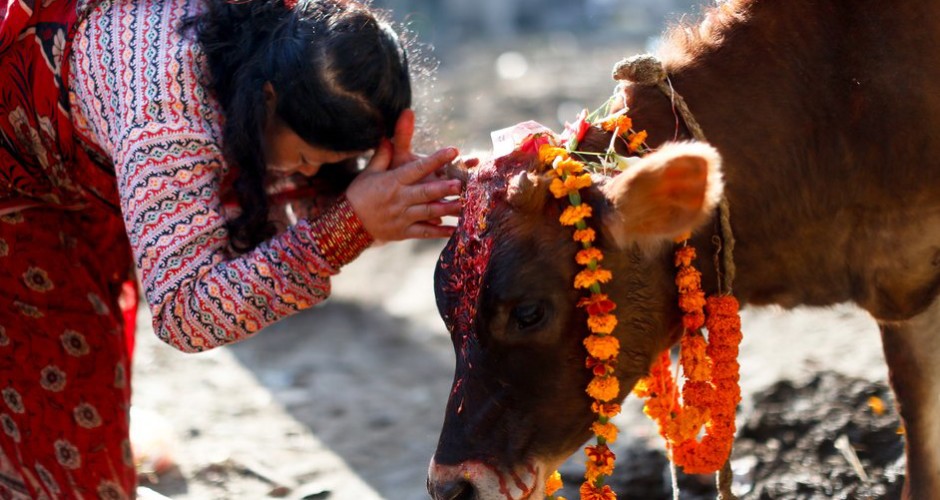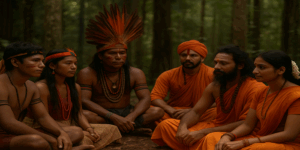LAST week I wrote about a group that was determined to prove that Hindus had always killed cows since the Vedas had allowed it. To support their assertions, practically every Sanskrit shloka has been mistranslated in order to fit into the theory.
I spent five years looking at translations when I wrote my dictionaries on Hindu, Muslim and Parsi names. It is amazing how mistranslations cause confusion in the tenets of the religion itself. In Buddhism for instance, the mistranslation of the Pali word for “food of pig” (meaning mushroom or vegetable) to “pig” — as the reason for the Buddha’s death — has caused millions of Buddhists to seize upon this excuse for eating meat.
Now, when there is a concerted effort to decry the ban on cow slaughter and to quote the Vedas (this hue and cry probably owes its origin to businessmen of the beef trade) as their backup, it is important for true Vedic scholars to look at the translations. The Shri Vardhman Parivar has done just that. I will use a few of their studies. Last week I wrote about the mischievous attempt to prove that Vedic yajnas used to kill animals. Now let us move to the main texts.
Allegation: Goghna means killing of cows and Atithigva/Atithigna is a person who served beef to guests.
Explanation: Gam root means “to go”. Atithigna/Atithigva means one who goes towards/serves the guest.
Goghna has several meanings. Even if we take “Go” to mean cow, Goghna means Go+Han: approaching cow. Han root means movement and knowledge and there are many references where Han is used for approaching.
Allegation: The Vedas talk of killing old barren cows (Vashaa) and bulls (Uksha).
Explanation: Uksha and Vashaa refer to a medicinal herb, also known as Soma. Even Monier Williams, in his Sanskrit-English Dictionary, states the same. Vashaa refers to the controlling powers of God and not a barren cow. If Vasha is used to mean a barren cow, then most Vedic verses will make no sense. For example, Atharvaveda 10.10.4 uses Sahasradhara to describe Vasha. How can a barren cow be compared with Sahasradhara be used to denote ample food, milk and water?
In other verses, Vashaa is used also as productive land, a good wife with children (Atharvaveda 20.103.15) or a medicinal herb.
Allegation: Brihadaranyak Upanishad 6.4.18 clearly states that if a couple desires a noble son, they should eat meat with rice. (Mansodanam) or bull (Arshabh) or calf (Uksha).
Explanation: Let us take Mansodanam first. There are four more verses just before this verse that recommend eating particular edibles with rice for having a child with Vedic wisdom. The other edibles are: Ksheerodanam (milk with rice), Dadhyodanam (yogurt with rice), water with rice and Tila (a pulse) with rice. The right word is Mashodanam and NOT Mansodanam. Masha means a kind of pulse. In fact, for pregnant women, meat is completely prohibited as per the Sushruta Samhita. Even if the word were to be Mansa, it means pulp and not meat. Amramansam means pulp of mango. Khajuramansam means pulp of date (Charak Samhita). Taittriya Samhita 2.32.8 uses Mansa for curd, honey and corn.
The Monier Williams Dictionary lists Rishabh (from which Arshabh is derived) to mean a medicinal plant (Carpopogan pruriens). Charak Samhita 1.4-13 lists Rishabh as a medicinal plant. The same is mentioned in Sushrut Samhita 38 and Bhavaprakash Purna Khanda. Uksha has already been explained.
Allegation: The word Badhyate recurs and means killing.
Explanation: As per any Sanskrit text on grammar or usage, Badhyate means to control. The Vedas, Upanishads are consistent in their teachings, which are against animal slaughter in general and cow slaughter in particular. Here are some of the shlokas:
Anumantaa vishasitaa nihantaa krayavikrayee
Samskartaa chopahartaa cha khadakashcheti ghaatakaah
Manusmrithi 5.51
Those who permit the slaying of animals; those who bring animals for slaughter; those who slaughter; those who sell
meat; those who purchase meat; those who prepare a dish out of it; those who serve that meat and those who eat
are all murderers.
***
Ya aamam maansamadanti paurusheyam cha ye kravih
Garbhaan khaadanti keshavaastaanito naashayaamasi
Atharvaveda 8.6.23
We ought to destroy those who eat cooked as well as uncooked meat, meat involving destruction of males and
females, foetus and eggs.
***
Anago hatya vai bheema kritye
Maa no gaamashvam purusham vadheeh
Atharvaveda 10.1.29
It is definitely a great sin to kill innocents. Do not kill our cows, horses and people.
***
Aghnyaa yajamaanasya pashoonpahi
Yajurveda 1.1
“O human! Animals are Aghnya – not to be killed. Protect the animals.”
***
Pashunstraayethaam
Yajurveda 6.11
Protect the animals.
***
Dwipaadava Chatushpaatpaahi
Yajurveda 14.8
Protect the bipeds and quadrupeds!
***
Urjam no dhehi dwipade chatushpade
Yajurveda 11.83
“May all bipeds and quadrupeds gain strength and nourishment.”
This mantra is recited by Hindus before every meal. How could the same eater who prays for the wellbeing of all beings then eat them immediately after?
***
Ghrtam duhaanaamaditim janaayaagne maa himsiheeh
Yajurveda 13.49
Do not kill cows and bulls who always deserve to be protected.
***
Aare gohaa nrhaa vadho vo astu
Rigveda 7.56.17
Cow slaughter is equivalent to human murder.
***
Sooyavasaad bhagavatee hi bhooyaa atho vayam bhagvantah syaama
Addhi trnamaghnye vishwadaaneem piba shuddhamudakamaacharantee
Rigveda 1.164.40 or Atharv 7.73.11 or Atharv 9.10.20
The Aghnya cows — which are not to be killed under any circumstances — may keep themselves healthy by use of pure water and green grass, so that we may be endowed with virtues, knowledge and wealth.
The Vedic lexicon, Nighantu, gives these synonyms of cow the words Aghnya. Ahi and Aditi and these appear frequently in the context of the cow. Yaska, the commentator on Nighantu, defines these as:
Aghnya: the one that should not to be killed.
Ahi: the one that must not be slaughtered.
Aditi: the one that should not to be cut into pieces.
***
Yah paurusheyena kravishaa samankte yo ashwena pashunaa yaatudhaanah
Yo aghnyaayaa bharati ksheeramagne teshaam sheershaani harasaapi vrishcha
Rigveda 10.87.16
Those who feed on human, horse or animal flesh and those who destroy milk-giving Aghnya cows should be severely punished.
***
Maa gaamanaagaamaditim vadhisht
Rigveda 8.101.15
Do not kill the cow. The Cow is innocent and Aditi — that ought not to be cut into pieces.
***
Antakaaya goghaata
Yajurveda 30.18
Destroy those who kill cows.
***
Yadi no gaam hansi yadyashwam yadi poorusham
Tam tvaa seesena vidhyaamo yatha no so aveeraha
Atharvaveda 1.16.4
If someone destroys our cows, horses or people, kill him with a bullet of lead.
The entire 28th Sukta or hymn of the sixth Mandal of the Rigveda is about the cow.
Aa gaavo agnamannuta bhadramakrantseedantu
Bhooyobhooyo rayimidasya vardhayannabhinne
Na taa nashanti na dabhaati taskaro naasaamamitro vyathiraa dadharshati
Na taa arvaa renukakaato ashnute na samskritramupa yanti taa abhi
Gaavo bhago gaava indro me achhaan
Yooyam gaavo medayathaa
Maa vah stena eeshata maaghanshasah
Everyone should ensure that cows are free from miseries and kept healthy.
God blesses those who take care of cows.
Even enemies should not use any weapon on cows.
No one should slaughter the cow.
Cow brings prosperity and strength.
If cows keep healthy and happy, men and women shall also keep disease-free and prosperous.
May the cow eat green grass and pure water. May they not be killed and bring prosperity to us.
The cow is referred in the Rigveda 723 times, in Yajurveda 87 times, in the Samaveda 170 times and in the Atharvaveda 331 times — total 1,331 times.
Look at the other texts – Manu Samhita, chapter 4, verse 162: A guru, a teacher, a father, a mother, a brahmana, a cow and a yogi all should never be killed.
Sri Chaitanya Charitamrita, Adilila, Chapter 17, verse 166, Caitanya Mahaprabhu: o-ange yata loma tata sahasra vatsara go-vadhi raurava-madhye pace nirantar
Cow killers and cow eaters are condemned to rot in hell for as many thousands of years as there are for each hair on the body of every cow they eat from.
Do not hesitate to consume cow urine and cow dung – they are sacred. But one should never eat the cow meat. A person becomes stronger by consuming Panchagavya.
People who write lies about the Vedas advocating cow killing or meat eating are attempting to pervert the entire basis of a religion that holds ahimsa as its basic tenet.
by Maneka Gandhi
To join the animal welfare movement
contact gandhim@nic.in,
www.peopleforanimalsindia.org
The Statesman

































